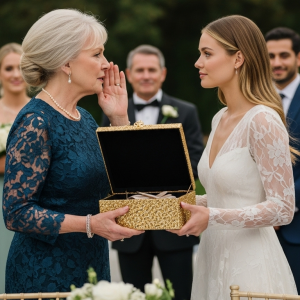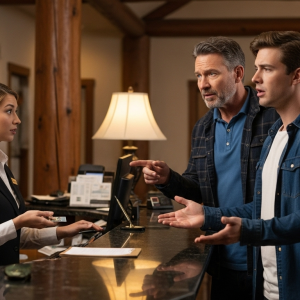The little house on the quiet, tree-lined street in Portland, Oregon, was David Miller’s sanctuary. To his wife, Sarah, it was a prison.
David’s study was the heart of the home, a small, cluttered room that smelled of old books, fresh coffee, and the electric hum of a world waiting to be born. The walls were lined with overflowing bookshelves and a large corkboard, which was a chaotic tapestry of maps, character sketches, and cryptic notes. Here, amidst the beautiful mess, David was not a struggling, unpublished author. He was a god, meticulously crafting the sprawling fantasy world of his novel series, The Shadow Gate. He would spend hours lost in its landscapes, his only company the rhythmic, comforting clatter of his keyboard.
That clatter was, to Sarah, the sound of failure.
She moved through the rest of the house with a restless, simmering discontent. The home, which they had once bought with such hopeful pride, now seemed to shrink around her daily. Its cozy charm had curdled into a suffocating smallness. Every corner was a reminder of a life she felt was beneath her.
This afternoon, the quiet resentment that was the constant background noise of their marriage flared into a sharp, pointed attack. She stood in the doorway of his study, holding her phone, her face a mask of carefully cultivated envy.
“Jessica just sent me a video of her new kitchen,” she announced, her voice dripping with a false, bright cheerfulness. “The island is Carrara marble. It’s bigger than our entire first floor, David. It must be nice to have a husband whose work actually, you know… pays for things.”
David’s fingers faltered on the keyboard. He looked up from the epic battle he was writing, his mind pulled violently back into the small, bitter skirmish of his own life. “That’s great for her, Sarah.”
“It is,” she said, her voice turning sharp. “It’s great to see what a real, adult life looks like. Meanwhile, you’re in here, still clattering away on those silly little stories. Don’t you ever want more than this? Don’t you ever get tired of living in this… small house, with these small dreams?”
He had no answer for that. He remembered a time, years ago, when she had been his biggest fan. She had read his early drafts with shining eyes, telling him he was a genius, that his stories would one day change the world. But the years had passed. The advances had been modest, the sales respectable but not life-altering. And her belief, the bedrock of his world, had slowly, painfully eroded, ground down by the relentless friction of her materialism and her friends’ ever-expanding kitchens.
A new email pinged in his inbox. It was from his literary agent, Ben. David’s heart gave a familiar, hopeful leap.
“Hey, listen to this,” he said, his voice pleading for a scrap of shared excitement. “Ben says a major studio is ‘extremely interested’ in the film rights for the series. He says the buzz is getting serious.”
Sarah didn’t even look up from her phone, where she was now texting with a furious, secret intensity. She let out a short, humorless laugh.
“Right. ‘Extremely interested,’” she scoffed, the words dripping with sarcasm. “Call me when they’re ‘extremely writing a check,’ David. I can’t pay our credit card bill with Hollywood ‘buzz.’ It’s always the same story, the same false hope.”
He saw the glow of her phone screen reflected in her eyes, saw the small, private smile that touched her lips as she read a reply. A smile that was never for him anymore. He knew, with a dull, aching certainty, that she was texting someone else. The lie of “dinner with coworkers” had become a weekly ritual. He knew he was losing her.
His gaze drifted to their wedding photo on his desk. Two young, hopeful people, smiling into a future that had never arrived. He was still that man, the one who believed in the power of stories. She had become someone else entirely, a woman who measured love in square footage and happiness in marble countertops. And he knew, with a grief that was already settling in his bones, that their own story was reaching its final, heartbreaking chapter.
The end, when it came, was not a dramatic, tear-filled confrontation. It was a cold, efficient, and brutally quiet execution.
It was a Tuesday night. David was making pasta, the simple, comforting meal they had shared on their first date. He was making a desperate, last-ditch effort to reconnect, to find some small spark of the life they used to have. The house was filled with the warm, hopeful scent of garlic and basil.
Sarah came home just after nine. But she didn’t come into the kitchen. She stood in the entryway, a place of transition, her expression unreadable. Beside her, on the floor, were two perfectly packed suitcases.
The scent of garlic and hope died in the air.
“What’s this, Sarah?” David asked, his voice barely a whisper, though he already knew.
“I can’t do this anymore, David,” she said, her voice flat and devoid of emotion. It was the voice of a person who had already left, who was merely dealing with the final, tedious logistics of her departure. “I cannot spend one more day in this tiny house, listening to you type, pretending that your ‘dreams’ are enough to build a life on.”
She gestured vaguely around the room, at the comfortable, lived-in furniture, at the photos on the walls, at the entire world they had built together. “This isn’t a life. It’s a waiting room. And I’m done waiting for a train that is never going to arrive.”
A low, purring rumble from the street outside punctuated the silence. Through the living room window, David could see the sleek, black silhouette of a Mercedes sedan, its headlights cutting twin cones of brilliant, intrusive light into their quiet suburban darkness. Her new, better life was waiting at the curb.
She reached into her purse and pulled out her house key. She didn’t hand it to him. She tossed it onto the small entryway table. The metallic clatter was the loudest, most violent sound he had ever heard. It was the sound of their marriage breaking.
“I’m leaving,” she said, her voice final. “I deserve something bigger. Something real.” She looked at him one last time, her eyes not filled with sadness, but with a cool, dismissive pity. “Good luck with your silly little stories, David. I hope they keep you company.”
She turned, her back straight and resolute, and walked out the door, closing it softly behind her. She did not look back.
David ran to the window, his heart hammering against his ribs. He watched as she got into the passenger seat of the Mercedes. A man in a sharp suit was behind the wheel. The car pulled away from the curb smoothly, its taillights a pair of receding red stars, disappearing into the night.
He was alone. The only sound was the bubbling of the pasta water on the stove, a pathetic, mundane counterpoint to the catastrophic implosion of his world.
The silence Sarah left behind was a physical entity. It was a crushing, suffocating weight that pressed in on David from all sides. The house, his sanctuary, had transformed in an instant into a museum of his own failure. Every object, every corner, was an exhibit of a life that was now over.
He walked numbly into the kitchen and turned off the stove. The scent of basil, which had been so hopeful moments before, now smelled of bitter regret. He saw her favorite mug by the sink, the half-finished crossword puzzle on the table, the small, mundane artifacts of a shared existence that was no longer shared.
The night that followed was the longest of his life. He didn’t sleep. He became a ghost in his own home, wandering from room to room, touching the things she had left behind. In the closet, a few of her dresses still hung, their empty shapes holding the faint, heartbreaking scent of her perfume. On the nightstand, her copy of a glossy business magazine lay open, a world of ambition and commerce she had desperately wanted to join.
He found an old shoebox filled with photos from their early years. There they were, young and laughing on a beach, their arms wrapped around each other, their faces alight with a future that seemed infinite and bright. He remembered the woman in those photos, the one who would stay up late reading his manuscripts, her eyes shining with belief. Where had she gone? When had her belief in him curdled into such profound, dismissive contempt?
He spent hours in his study, but he couldn’t write. The world of The Shadow Gate, his usual refuge, was closed to him. The clatter of the keys, the sound she had hated so much, felt like a hollow, lonely echo in the empty house. His grief was a vast, silent ocean, and he was drowning in it.
He finally fell into a fitful, exhausted sleep on the sofa just as the first, grey light of dawn began to seep through the windows.
He was jolted awake hours later by a sharp, insistent knocking at the front door. It was a sound so out of place in the new, tomblike silence of his home that it felt like a violation. He stumbled to his feet, his body aching with grief and lack of sleep, and pulled the door open.
Standing on his porch was a woman who looked as if she had stepped out of a different universe. She was in her late forties, dressed in a razor-sharp, dark grey business suit. Her hair was pulled back in an elegant, severe chignon, and she held a sleek, expensive leather briefcase. She was a creature of boardrooms and power lunches, an alien life form on the humble, slightly peeling porch of his Portland home.
“Mr. David Miller?” she asked, her voice crisp and professional, with a faint, unmistakable accent of Los Angeles efficiency.
David, still disoriented, his mind a fog of grief, could only nod.
“My name is Eleanor Jennings,” she said, extending a hand. Her handshake was firm and brief. “I’m a senior partner with Klein, Feldman, and Chase, an entertainment law firm in Hollywood. Your agent, Benjamin Carter, asked me to fly up here this morning to handle this matter in person. May I come in? We have had… a significant development.”
David, his mind still struggling to process the surreal turn his morning had taken, led Ms. Jennings into the house. He gestured towards the small, humble dining room table, the very same table where Sarah had so often voiced her discontent. The contrast between the powerful, impeccably dressed Hollywood lawyer and the modest, slightly worn surroundings was almost comical.
Ms. Jennings did not seem to notice. She placed her briefcase on the table and opened it with a series of sharp, satisfying clicks. She laid out a stack of documents so thick it looked like a novel in itself. David stared at the papers, his mind a numb haze. He was a man going through the motions, his emotional core still shattered by the events of the previous night.
“Mr. Miller… David,” she began, her tone softening slightly as she took in his exhausted, grief-stricken state. “Ben has been keeping me apprised of the situation for the past few weeks. I know there has been a great deal of interest in your work. I am here to tell you that the ‘interest’ phase is officially over.”
She took a deep breath, her professional demeanor returning. “As you know, there have been several offers for the film and streaming rights to your novel series, The Shadow Gate. Over the last seventy-two hours, this has escalated into an aggressive, closed-door bidding war between three of the largest media conglomerates in the world.”
David was barely listening. Bidding war? Conglomerates? It all sounded like a foreign language. The only thing that felt real was the echoing silence in the house, the empty space where Sarah used to be.
Ms. Jennings seemed to sense his distraction. She leaned forward, her gaze sharp and direct, forcing him to focus.
“David. I am pleased to inform you that, as of 11:00 PM Pacific time last night, after a final, record-breaking offer, we have reached an agreement. The full, exclusive, global film, television, streaming, and merchandising rights for the entire Shadow Gate series have been sold to Paramount Global.”
She paused, letting the name of the studio hang in the air. David just blinked, his mind still failing to connect the dots.
She delivered the first explosion.
“The final, accepted offer, including upfront fees and guaranteed backend points, is for one hundred and twenty million dollars.”
The number was so vast, so astronomical, that it didn’t even register as real. It was a joke. It was a line from a movie. It was not something that happened to people like him, people who lived in small houses on quiet streets in Portland.
“I… I’m sorry,” David stammered, shaking his head as if to clear it. “Could you… could you repeat that?”
Ms. Jennings smiled, a genuine, satisfied smile. “One hundred and twenty million dollars, Mr. Miller. Congratulations. You are now a very, very wealthy man.”
But she wasn’t finished. Her expression shifted, becoming more clinical, more lawyerly. She tapped a separate, smaller folder on the table.
“Which brings us to one final, rather critical piece of business,” she said, her voice now surgically precise. “My office received a preliminary notification this morning from a local firm here in Portland. It was from a lawyer representing your wife, Mrs. Sarah Miller. The notification states her intention to file for divorce and separation of assets.”
The name ‘Sarah’ was a bucket of ice water, snapping David back to the painful reality of his life. The money, the deal, it all faded away, replaced by the fresh, raw wound of her departure.
Ms. Jennings looked at him, her eyes sharp and analytical. “This is a time-sensitive and legally crucial question, David. I need you to be precise. Exactly when did Mrs. Miller officially vacate the premises? When did she leave this home?”
David thought back to the night before. The tossed keys. The waiting Mercedes. The final, soft click of the door. The memory was a fresh stab of pain.
“Last night,” he said, his voice hoarse. “She packed her bags and she left last night. Around nine-thirty.”
A slow, sharp, predatory smile spread across Ms. Jennings’ face. It was the smile of a shark that had just scented blood in the water.
“Excellent,” she said, her voice dropping with satisfaction. “That is the best news I’ve heard all day.”
She tapped the main contract. “Because this agreement was finalized and digitally signed by all parties at 11:00 PM last night. Under Oregon state law, since she had officially and permanently abandoned the marital residence prior to the moment this asset was legally created, the entire one-hundred-and-twenty-million-dollar deal is considered your own separate, personal property.”
She leaned back in her chair, the final, devastating verdict delivered.
“She doesn’t get a dime.”
The news of the Shadow Gate deal exploded across the entertainment industry landscape. It was the lead story on Variety, The Hollywood Reporter, and every major news outlet. A nine-figure deal for an unpublished novelist was the stuff of Hollywood legend. David Miller’s name, once known only to a small circle of fantasy readers, was suddenly on the lips of everyone in the business.
Sarah Miller saw it for the first time on her phone. She was sitting at a sun-drenched table at the city’s most expensive brunch spot, across from her new life. Richard, the handsome, confident real estate developer, was telling a story about a property deal in the Pearl District. Sarah was only half-listening, feeling a smug, delicious sense of arrival. This was her new world. Champagne on a Tuesday. Conversations about seven-figure deals.
Then her phone buzzed with a news alert. She glanced at it casually. And then she froze.
Her champagne flute slipped from her fingers, shattering on the stone patio. The headline was impossible. “PARAMOUNT PAYS $120M FOR UNKNOWN AUTHOR DAVID MILLER’S ‘SHADOW GATE’ FANTASY SERIES.”
The world around her went silent. The sounds of polite chatter, of clinking glasses, all faded away into a deafening roar in her ears. One hundred and twenty million dollars. The number was a physical blow, knocking the air from her lungs. It wasn’t real. It couldn’t be real. It was another one of his pathetic, hopeful fantasies.
But it was on every news site.
She excused herself, her hands shaking so violently she could barely hold her phone. She found a quiet corner and frantically dialed David’s number. He answered on the third ring, his voice quiet and distant, a voice she barely recognized.
“David!” she shrieked, her voice a ragged, ugly mixture of rage and disbelief. “What is this? What is this joke? One hundred and twenty million dollars?”
“It’s not a joke, Sarah,” he replied, his tone unnervingly calm.
The dam of her composure broke. “It was just a fight, David! You know how I get! I was just cooling off! I was coming back! That’s our money! We’re married! That is OUR money!”
There was a long pause on the other end of the line. When he finally spoke, his voice was not angry. It was just… tired. And final.
“You were very clear, Sarah,” he said quietly. “You didn’t want to live in a small house with small dreams. You made your choice. You threw away the key.” Another pause. “I think it’s best if we let the lawyers handle it from here on out. Goodbye.”
The line went dead.
She stood there, the phone pressed to her ear, listening to the dial tone. The sound of her future dissolving.
The days that followed were a slow, agonizing descent into her own personal hell. Her lawyer confirmed the devastating truth: the timing of her departure had legally disinherited her. Her act of final, definitive abandonment had cost her sixty million dollars.
Richard, the pragmatist, saw the situation for what it was. The asset he had acquired—the soon-to-be ex-wife of a struggling novelist—had not matured as expected. In fact, she had spectacularly divested herself of her own value. His calls became less frequent. His invitations dried up. Her new, bigger life was revealed to be just as hollow as the promises he had whispered to her.
She was left with nothing. No husband. No nine-figure fortune. No shiny new life. All she had was the bitter, acid taste of her own terrible, life-altering miscalculation. She had traded a diamond for a rhinestone, and she had done it the day before the world found out the diamond’s true worth.
Six months later, David Miller stood on a sprawling, chaotic film set in New Zealand. The epic, fantastical world he had created in his small, cluttered study had been brought to life on a scale that still took his breath away. Orcs in full prosthetics mingled with knights in gleaming armor. The director, a man with three Oscars to his name, was listening intently as David explained a fine point of his world’s mythology.
He was the same quiet, thoughtful man he had always been, but he moved with a new, unshakable confidence. It was the confidence of a man whose vision had been validated on a global scale. He was no longer the struggling artist. He was the creator.
After a month on set, he did something that baffled his new Hollywood friends. He didn’t buy a sprawling mansion in the Hollywood Hills or a penthouse in Manhattan. He went home.
He returned to the small, quiet house on the tree-lined street in Portland.
From the outside, it looked the same. But inside, it had been reborn. The cramped kitchen had been tastefully and brilliantly renovated, with slate countertops and custom-built bookshelves for his cookbooks. The living room was filled with comfortable, beautiful furniture and original art he had always dreamed of owning. The entire house was a testament to quiet, understated success.
His study, however, had undergone the biggest transformation. It was now a state-of-the-art writer’s studio, with a sleek new computer, an ergonomic chair, and a sound system for listening to film scores as he wrote. But the old corkboard, with its chaotic tapestry of notes and maps, still held pride of place on the main wall.
He sat at his new desk. He looked at the wedding photo, which was no longer there. In its place was a framed photograph of his parents, the ones who had bought him his first typewriter and told him his “silly stories” were wonderful.
He turned to his computer, the blank page glowing with infinite possibility. He took a deep breath, the air in the house no longer tasting of resentment, but of peace and creative freedom. He placed his fingers on the keyboard and began to type the first words of the next chapter.
The house was not, and had never been, a symbol of his limitations. It had been his crucible. It was a testament to the profound, unshakeable truth that the greatest, most life-changing things can, and often do, come from the most humble and unexpected of places. He didn’t need a bigger house. He just needed to keep building bigger worlds inside it.




